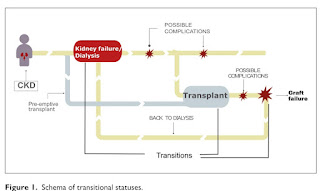The fear and sense of wasting precious time is a common experience among patients with organ failure. This is clear when one follows accounts of people on the waiting list in documentaries such as #GeordieHospital (Channel 4), Heart Transplant: A Chance to Live (BBC2) and Gift of Life (Channel 5).
I am lucky that all my organs appear to work properly for now but these documentaries have given me a bit of an education on the subject and sensitised me to the challenges that patients, their families, clinical and medical carers go through.
In my reading to improve my understanding of the subject, I've come across the concept of "status passage" as one that helps to explain the transitional nature of living with kidney failure.
Having interviewed 50 patients and 14 health professionals in two healtchare facilities in Buenos Aires, Roberti, Alonso, Blas and May identified three main transitions between early stages of kidney disease and failure to dialysis after graft failure.
 |
| Screenshot of transitional moments that cause fear and anxiety for people with kidney failure |
For various reasons, TV documentaries could not possibly reflect on experiences of organ failure with the detail that a journal article can. But they illustrate such challenges as the anxiety of individuals waiting to be told if a matching organ will be offered to them.
Or consider the trepidation of a patient (captured in film) who hugs a relative good bye before being wheeled on a stretcher to an operating theatre, having received an organ offer, with the knowledge they may never see their loved ones again. These are all micro moments within the status passages researchers describe.
Comments
Post a Comment